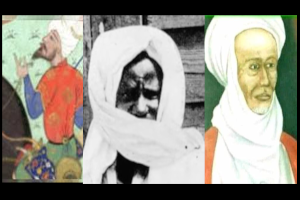Introduction:
Islam, as a religion, has evolved over centuries, adapting to various cultures and regions while maintaining its core principles. Examining the lives of influential figures like Shah Jalal, Cheikh Ahmadou Bamba, and Modibo Adama offers a fascinating insight into how Islam took root and flourished in diverse parts of the world. Despite geographical distances and cultural disparities, these individuals played pivotal roles in shaping Islamic traditions and practices in their respective regions.
Shah Jalal:
Born in the 14th century in present-day Bangladesh, Shah Jalal was a Sufi mystic and preacher whose teachings had a profound impact on the spread of Islam in the Bengal region. He arrived in Sylhet, then a Hindu-dominated area, and through his spiritual teachings and compassionate demeanor, he won the hearts of the locals. Shah Jalal’s approach emphasized inclusivity and tolerance, traits that helped bridge the gap between different communities. His mausoleum in Sylhet remains a revered site for Muslims and non-Muslims alike, symbolizing the enduring legacy of his peaceful propagation of Islam.
Cheikh Ahmadou Bamba:
In Senegal, West Africa, Cheikh Ahmadou Bamba emerged as a prominent figure in the late 19th and early 20th centuries. Founder of the Mouride Brotherhood, Bamba preached a message of hard work, piety, and devotion to God. His teachings emphasized the importance of spiritual purification and service to humanity. Despite facing persecution from colonial authorities, Bamba’s unwavering commitment to his faith and his people earned him widespread respect and admiration. Today, the Mouride Brotherhood remains one of the largest and most influential Sufi orders in Senegal, embodying Bamba’s vision of a spiritually enriched and socially engaged community.
Modibo Adama:
Moving to the heart of Africa, Modibo Adama’s story unfolds in the early 19th century in present-day Nigeria. As the founder of the Adamawa Emirate, Adama played a crucial role in the Islamization of the region. Through diplomacy and military prowess, he expanded his domain and promoted Islam as a unifying force among diverse ethnic groups. Adama’s leadership fostered a climate of religious tolerance and cultural exchange, laying the groundwork for the enduring presence of Islam in northern Nigeria and Cameroon. His legacy endures in the traditions and institutions of the Adamawa Emirate, which continue to shape the religious and social fabric of the region.
Common Threads:
Despite the geographical and temporal differences in their lives, Shah Jalal, Cheikh Ahmadou Bamba, and Modibo Adama shared several commonalities in their approach to spreading Islam:
1. Spiritual Guidance: Each of these figures served as spiritual guides for their followers, offering moral guidance and religious instruction to cultivate a deeper connection with God.
2. Social Justice: They were advocates for social justice, championing the rights of the oppressed and marginalized communities within their societies.
3. Adaptability: Recognizing the importance of adaptation, they integrated Islamic teachings with local customs and traditions, making the religion accessible and relevant to the people they served.
4. Resilience: In the face of adversity, whether from colonial powers or internal dissent, they remained steadfast in their commitment to Islam and its principles.
Conclusion:
The biographies of Shah Jalal, Cheikh Ahmadou Bamba, and Modibo Adama illustrate the diverse paths through which Islam evolved in different parts of the world. Despite the unique challenges and contexts they encountered, these individuals demonstrated the universality of Islamic values such as compassion, justice, and devotion to God. Their legacies continue to inspire millions of followers worldwide, underscoring the enduring relevance of Islam as a dynamic and transformative faith.



